“Acting isn't difficult. I'd never take lessons. You just do it, you know? Everybody in life acts anyhow. President Nixon, the Pope, even John Lennon.” — Shelley Duvall to Patricia Bosworth, 1971
Robert Altman was frank about his first impressions of Shelley Duvall. He thought she was full of shit. He assumed she was a hopeful actress acting “quirky” to get attention, to suck up to him, to get the part. He saw a lot of that in the business. He assumed this weird skinny girl with pasted-on eyelashes was the same. He didn’t get it.
Shelley Duvall we found down there in Houston. I had gone away for a week, and the guys I was working with, Tommy Thompson and Brian McKay, said, "Oh, we went to a party, found a girl, and you've got to meet her. She is special!" I said, "Oh, shit, these guys probably got drunk ..." When they'd seen her she was trying to sell paintings by her boyfriend. So I had her come in to see me, and she didn't know that we were looking at her for a part. But I didn't believe her. I thought it was an act… "Hi, what do you want me to do?" I said, "Oh, you'll want to read for this part." "What's that mean?" I said, "What does it mean? You know how to read?" I decided to shoot a test, so I took her out in the park and put a camera on her and just asked her questions. I was really quite mean to her, as I thought she was an actress. But she wasn't kidding; that was her. She was an untrained, truthful person. She was very raw in Brewster but quite magic.
If Altman’s first impression was incorrect, then Duvall had an equally confusing reaction to this weird guy who invited her over, and she thought it was for one thing, and then she realized it was something else, and she had no idea what was going on. In 1981, she told the story to Cosmopolitan:
I was twenty and living with Bernard in his parents' house in Houston, and we used to give a lot of parties to show off his paintings. Friends would invite other people, and one night two guys showed up saying they knew a patron of the arts and could I bring some paintings to show him. Actually, I was pretty suspicious. I thought he was making some kind of porno movie or something. Then somebody shouted, "But this is Robert Altman. He directed M*A*S*H.” I hadn't seen the picture, hadn't heard of him and couldn't have cared less. Anyway the same person asked for my telephone number, and just to get out of there I gave it to him, figuring I was safe. After all, my father's a lawyer.
“After all, my father’s a lawyer.” is my favorite part.
Altman realized he was wrong almost immediately, and did the riskiest most wild thing possible: He cast Shelley Duvall, who had no idea who he was, and didn’t care who he was, as the lead in Brewster McCloud, opposite Bud Cort. Altman regular Michael Murphy laughed about it later:
He's intrigued by her and gives her the starring role. And she has to start shooting in like three days. The closest she's been to a movie is in the theater, sitting in a chair. Of course she was great. She had that real, natural way, and Bob was the kind of guy who could get that out of you. He had her so relaxed and easy. She blew everybody off the screen in that movie. She was such a natural.
So many people don’t interrogate their (often incorrect) first impressions. People don’t just love being right. They need to be right, and because they need to be right, they dig in their heels, and insist their first impression was correct. OR, they won’t admit their REAL first impressions so they can make it seem like they were right from the get-go: “I always knew she would be a star.” or “I knew instantly he was the next big thing.” Sam Phillips proclaimed for decades he knew immediately Elvis was going to be a star, The One. No, Sam, it wasn’t you. You were like “who the hell is this pimply kid singing Ink Spot songs? Next.” It was Marion Keisker - who wasn’t your secretary, but who RAN Sun Studio with you, who recognized - instantly - pimples and Ink Spots and all - that there was something about this kid. No shade on Sam Phillips. He was right about a lot of things. But it was Marion Keisker who kept bringing up Elvis, saying to Sam, “Let’s have him record this demo.” or “What about that shy kid who came in last year? Could we give him a try?” Sam Phillips, for very obvious reasons, had a vested interest in making it seem like he knew from the jump.
Altman got a kick out of how wrong he was at first about Duvall. He “told on himself” over and over again, a rare quality indeed.
Shelley Duvall was a rarity, in more ways than one. She was an artist and a muse. Altman knew he could toss her into anything, and she would at the very least be watch-able. Why was she so watch-able? Because she was real. “Raw” is the word everyone uses, including Altman. But “raw” is a deceptive word. You can be “raw” as hell and still be self-conscious when everyone is looking at you and waiting for you to do something. You can be “raw” in real life and be unable to bring that “raw”-ness to the camera, to a fictional circumstance. Shelley Duvall was brilliant in that she was able to be as unself-conscious, as raw, as HERSELF, when the camera was rolling as she was in her real life. There was no difference for her. It’s like she roller-skated into the frame from offscreen and there was no boundary between the two sides. Something happens to people - even very very good actors - when they hear “action”. You go from being a real person to an actor playing a scene. There’s a little interior “click” that happens. Shelley Duvall didn’t experience that click.
This is not to say she didn’t think about what she was doing and make conscious choices. She did. This is why she is called a genius. This is why “raw” is not the best way to discuss her, because it doesn’t give her enough credit.
Think about 3 Women, and how she always gets her dress caught in the car door.
The first time it happened it was an accident, and the crew assumed they’d have to do another take. But Altman loved accidents. He asked her to do it every time she got in the car. So it became a “bit”, a continuity-marker in this very boundary-less film.
This is what I want to underline: One of the most challenging things to do as an actor is to repeat what was at first an accident. Because the first time you did it you had no idea what you were doing, it was an accident. So to then have to add a layer of consciousness to it and CHOOSE to do it, while still making it LOOK like it’s an accident …
If you don’t get what I’m saying, then try it yourself at home. When an accident occurs - you get your sleeve caught on a doorknob, you trip a little bit over the door jamb, you accidentally smudge peanut butter on your nose, whatever … take a second, and then try to repeat it. Then try to repeat it again. And make sure that when you repeat it, it feels/looks like it’s the first time.
Genius is hard to talk about, and the word is thrown around indiscriminately. If you break something down into parts, you sometimes make the organic sound mechanical. It’s one of the risks in writing about this stuff.
But Shelley Duvall getting her dress stuck in the car door over and over again is a nuts-and-bolts example of what I am talking about and what I mean by her genius. Every time it happens it seems like it’s happening for the first time, AND every time it happens she appears totally unaware of it. And yet she the actress not only IS aware of it, she is doing it on purpose. John Strasberg, son of Lee Strasberg, said that good acting was essentially being able to do things “accidentally on purpose” (the title of his book). Duvall was a master at it. You never clock the “on purpose” part.
Sissy Spacek remembered working with Duvall on 3 Women:
There was a lot of improvisational stuff. He would give us a scene in the morning and then it would grow. It was so freeing working with him after having worked with other directors. The way he works is all very naturalistic ... Shelley always said the three women were the id, the ego, and the superego. At that time I had never heard of the id or the superego. She was way ahead of me.
Spacek’s comment gets at what I’ve been trying to say. Duvall was “untrained”, yes. She was “raw”, sure. But she wasn’t just some amoeba roiling around without any understanding of what was going on. People were baffled by 3 Women. Duvall was not. She understood it perfectly. Along those lines, Altman remembered years later:
Shelley wrote all of [Millie’s] letters, all of those recipes, all of her diary stuff. I don't know any writer who could have done it better. She was wonderful in it. She allowed the fool in her to show itself, what I call the "pink stuff", what you normally don't show people. Real actors show the "pink stuff".
While she will be forever known as the terrified wife in The Shining, not enough credit is given to her for her amazing project, Shelley Duvall’s Faerie Tale Theatre, which ran from 1982-1987. It is a far more apt legacy, and expands our understanding of this intelligent passionate woman, who had an idea and made it come to fruition, creating an archive of episodes starring some of the greatest actors of not only her time, but ours. Jeff Bridges! Gena Rowlands! The list is endless. Faerie Tale Theatre was her baby, and I feel so fortunate I watched these things when I was an actual child. I had no idea who Shelley Duvall was. I wasn’t watching Nashville or The Shining when I was a kid. But I did watch this, and I knew her name because it was in the title of the show. She was this soft-spoken gentle presence in her introductions, and she wore these long dresses in soft colors like peach or lemon, and she emanated a kind of humor and lightness that was captivating to me. She felt very safe. You could also tell she was different. I didn’t grow up in a family that prized conformity, and my aunt was a successful actress, and she was different, too, and her actor friends were different, and it was all very normal to me to be around people who were different. And Shelley Duvall seemed like that. Maybe that’s why she seemed safe to me.
Even when you’re a kid, or maybe especially when you’re a kid, you don’t just recognize authenticity. You can FEEL it.
Robert Altman didn’t recognize at first that what he was seeing when he first met her wasn’t an act, it was authentic. How can someone be that different but ALSO authentic? It doesn’t seem possible!
It was.
The industry tossed her out. It does not value difference like Duvall’s. It SEEMS like the industry should love and protect difference, but the opposite is the case. Her last years were difficult. It hurt my heart. I remember in around 2009 or 2010 when she suddenly joined Facebook, and friended everybody. She friended me. She friended my friends. It’s like she just went through every “film buff” list possible and friended everyone. She liked posts, she left comments. She responded to comments. She found a community. She left a beautiful comment on a photo I posted of my mother when she was in high school, saying something like “I love this, this is so beautiful.”
I wanted to scream SHELLEY I LOVE YOU but I did not. I just heart-ed her comment, to let her know I appreciated it, knowing, in my own heart, a “heart” couldn’t convey my appreciation of her, because of course, by then, I had seen Brewster McCloud, McCabe and Mrs. Miller, Nashville, 3 Women, Popeye, The Shining … many many times over.
Shelley Duvall had no awareness that most people hide “the pink stuff”, that people would prefer it if you left “the pink stuff” out of their interactions with you. This type of conformity and repression just didn’t factor at all into how she operated. She didn’t know that hiding “the pink stuff” was even a thing. Why would you hide it? The pink stuff is the best stuff. The pink stuff is the one thing we all share. How much energy is wasted trying to hide our pink stuff, our flaws, our vulnerabilities, our smarts, our humanity.
Thank God Robert Altman figured out almost immediately he was wrong about her. He thought he was meeting a facade of a person, an “act”.
But then it dawned on him.
Wait, wait, wait … this is … authentic? … How did I get this so wrong? This is the genuine article, and she’s standing right here in front of me. Jackpot.

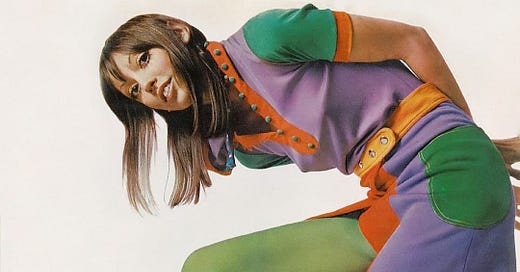



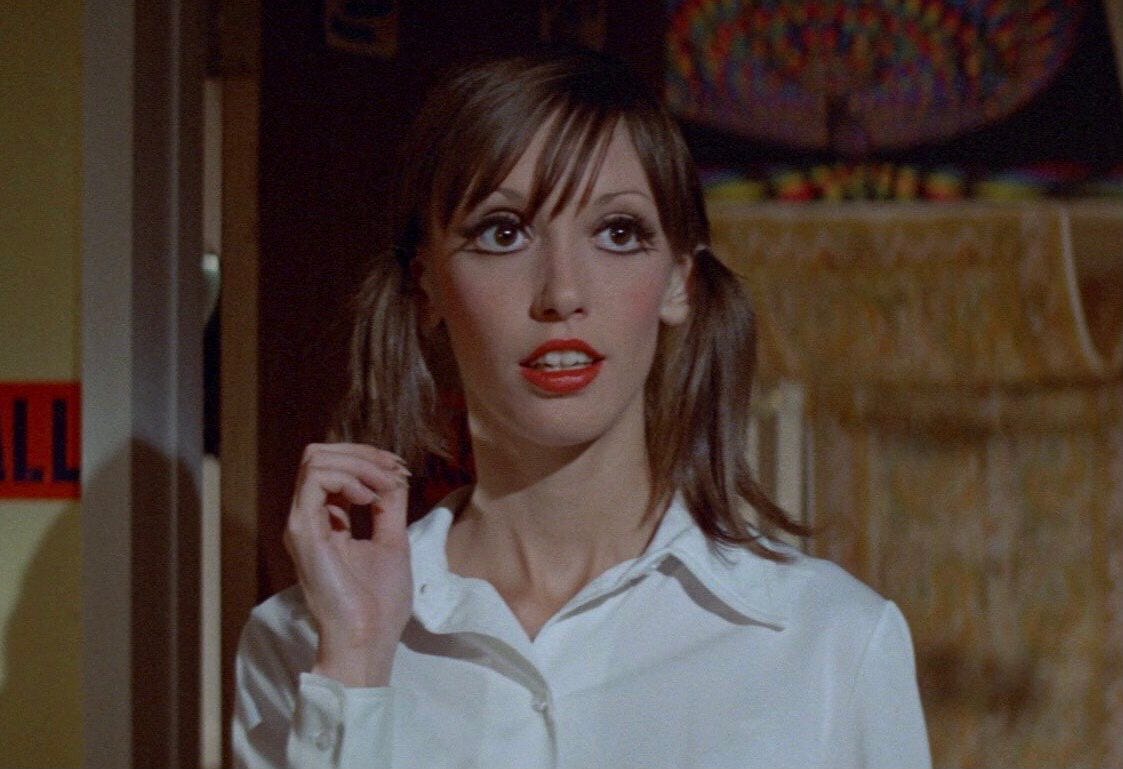
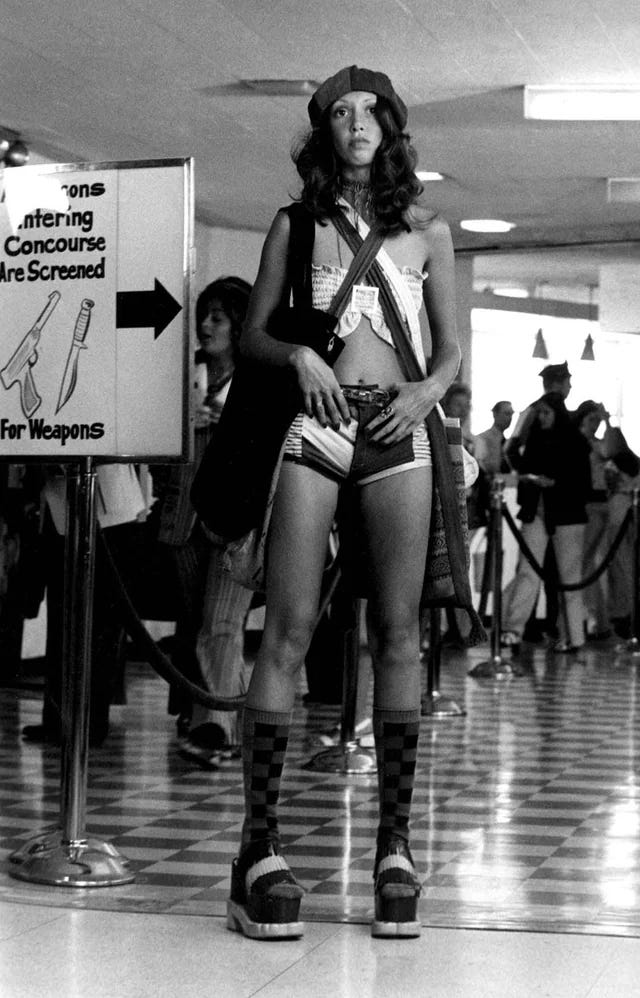
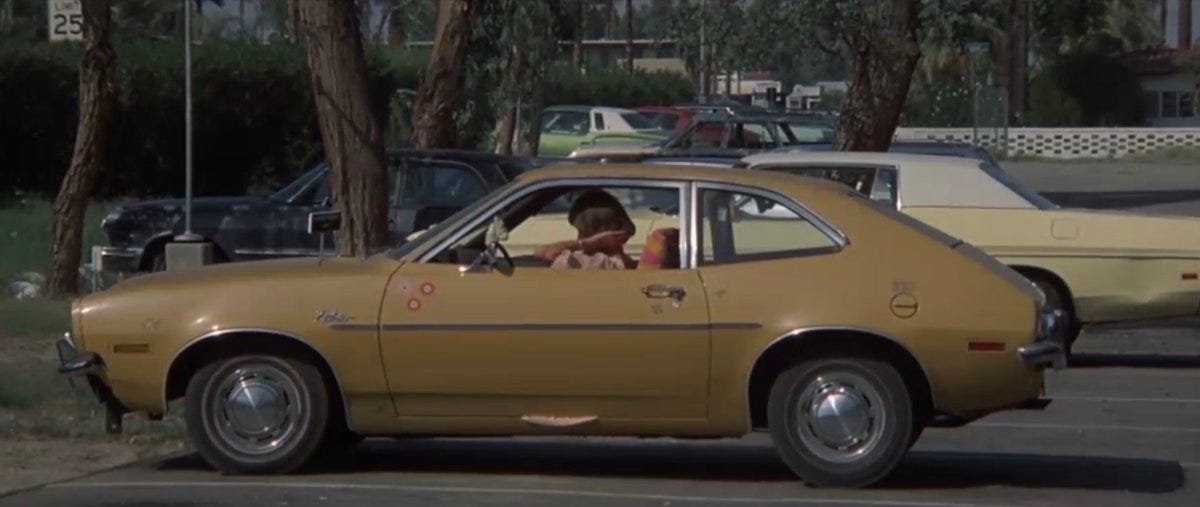
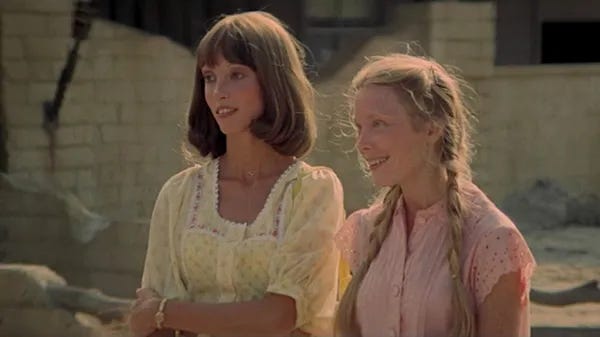
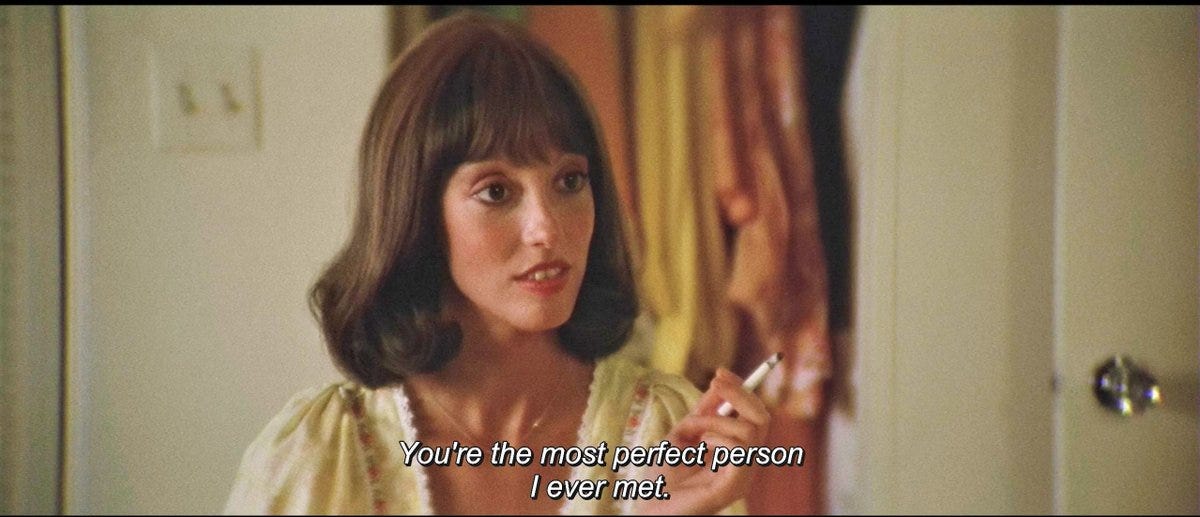
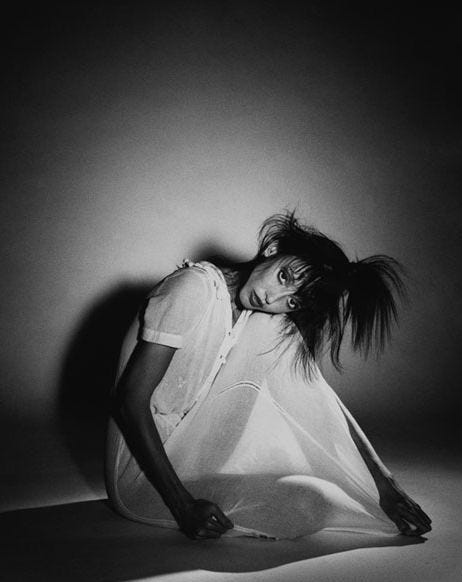
Great to read something about film--especially, these days--that skips the superficial and gets to the heart of the matter about everything. Duvall, in the nature of her being, stood for so much that is avoided, hidden, denied, or systematically stomped out--especially, in the totalitarian film business. I knew I would love this piece, sat down to read it immediately, and didn't stop till I was done--like a plant just starved for water. Big thanks to Ms. O'Malley for understanding its value and rendering it so beautifully.
I love this, this is so beautiful 💛✨